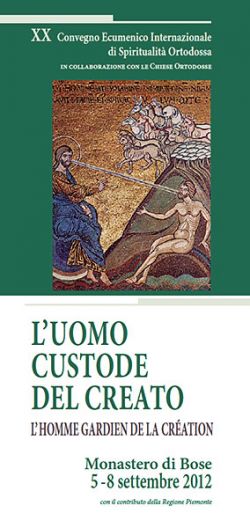Final press release
XX International Ecumenical Conference
In the Christian tradition, both of the East and of the West, to inhabit the earth is a task and a gift confided to human beings, custodians, but at the same time guests of creation
XX International Ecumenical Conference
on Orthodox spirituality
In the Christian tradition, both of the East and of the West, to inhabit the earth is a task and a gift confided to human beings, custodians, but at the same time guests of creation. To Man—Custodian of Creation was dedicated the 20th International Ecumenical Conference on Orthodox Spirituality, organized in collaboration with the Orthodox Churches and held at the Bose Monastery on 5–8 September 2012.
The Orthodox Churches were the first to call the attention of Christians to the topic of ecology as a spiritual problem. In 1989 patriarch Demetrius of Constantinople proclaimed 1 September, the beginning of the Byzantine liturgical year, as a “day of creation”, in which prayers and supplications are to be raised for the defense of the creation and invited “all men of good will” to abstain from damaging nature. His successor, the present ecumenical patriarch, Bartholomew I, followed him in this with great conviction and numerous initiatives, constantly recalling the spiritual and Christian foundations of the ecological commitment. In his message to the conference he exhorted the Churches to become aware of the gravity of the ecological crisis and to “discern the ties between spiritual commitment and ecological moral practice”. The numerous messages of Church heads (pope Benedict XVI through his secretary of state, cardinal Tarcisio Bertone, cardinal Kurt Koch, the patriarchs of Alexandria, Antioch, Moscow, Serbia, Romania, the archbishop of Athens, the catholicos of all the Armenians Karekin II, the primate of the Anglican communion, Rowan Williams, the secretary of the World Council of Churches) gave a convinced reply to this urgency, aware that the destruction of the environment is a sin against God’s commandment and that “a theological discussion of environmental problems with the Orthodox sister-Churches and an exchange of experiences within interconfessional and interreligious dialogue” is of great importance (patriarch Kirill of Moscow in his message).
The ecumenical importance of the ecological problem, which the Churches are rediscovering with ever greater conviction, was shown by the presence of official delegations of the Orthodox Churches and of the Catholic Church. In particular, present were cardinal Roger Etchegaray, vice-dean of the college of Cardinals, archbishop Antonio Mennini, apostolic nuncio in Great Britain, bishop Mansueto Bianchi of Pistoia, president of the commission for ecumenism and interreligious dialogue of the Italian bishops’ Conference, bishop Gabriele Mana of Biella; metropolitans German of Volgograd (Moscow Patriarchate), Georges of Mount Lebanon (Patriarchate of Antioch), bishops Stefan of Homel’ (Exarchate of Belarus of the Moscow Patriarchate), Ioannis of Thermopylae (Greek Orthodox Church), Melchisedek of Pittsburgh (Orthodox Church of America), father Tavma Kachatryan (Armenian Apostolic Church), archimandrite Athenagoras Fasiolo (Orthodox Archdiocese of Italy and Malta), canon Hugh Wybrew (Church of England), Tamara Grdzelidze (World Council of Churches), mons. Andrea Palmieri, under-secretary of the Pontifical Council for the promotion of Christian Unity.
